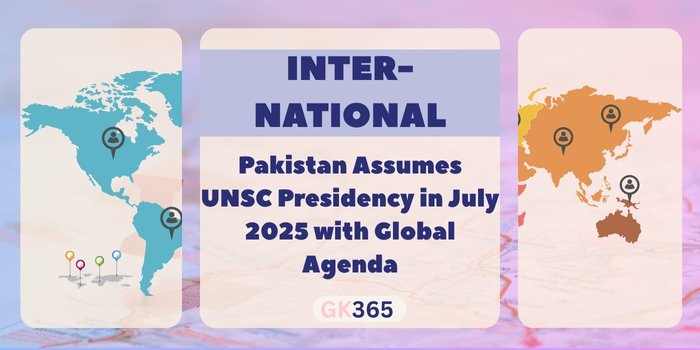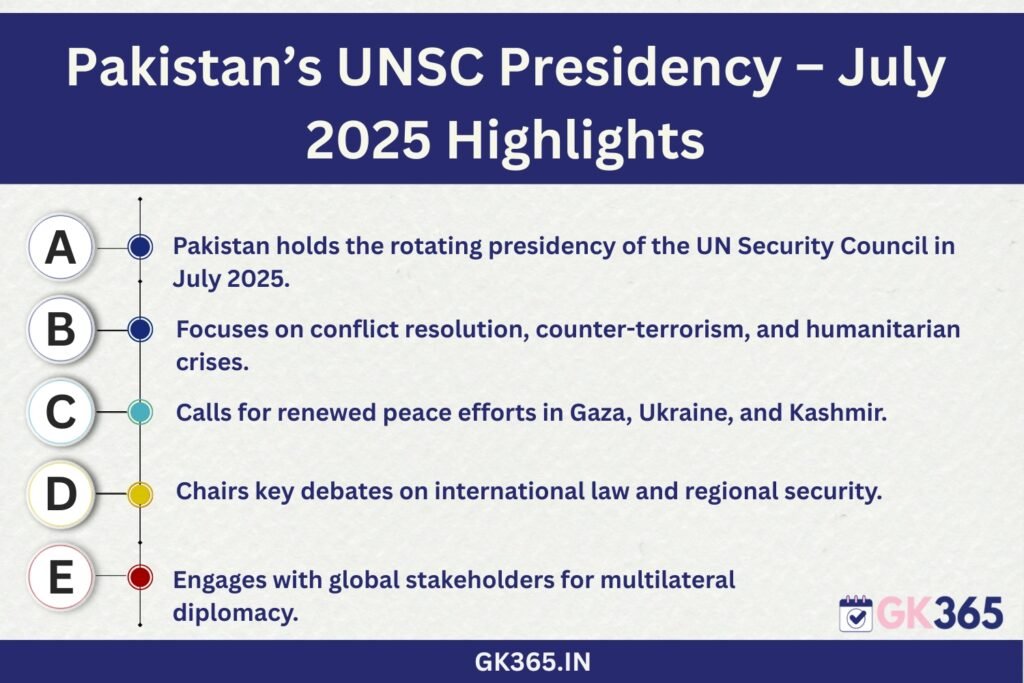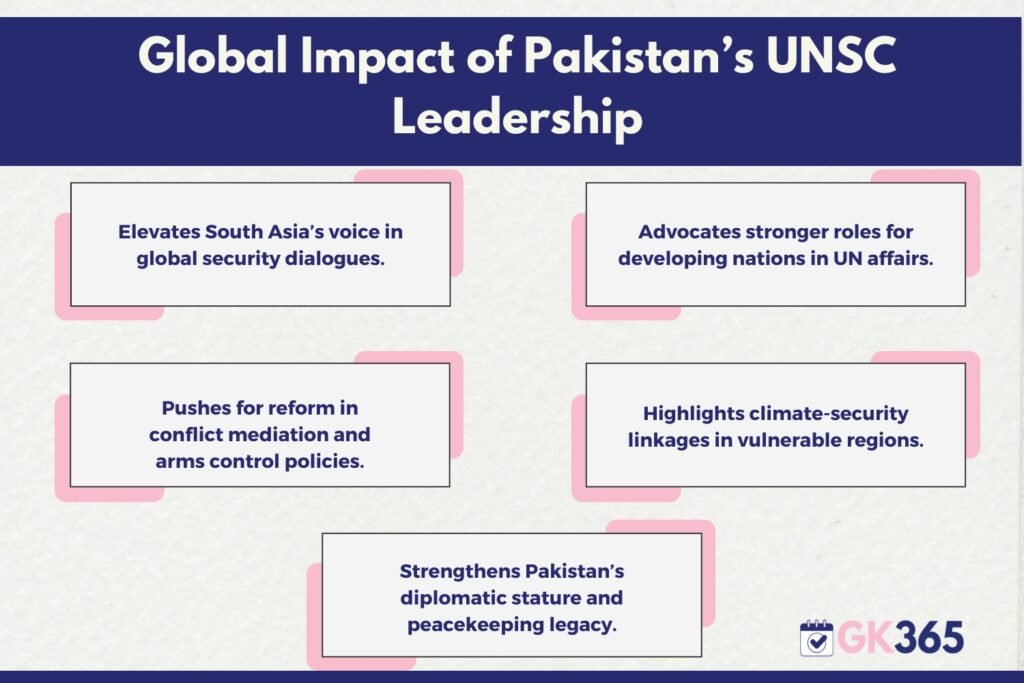style>
.podcast-frame {
border: 1px solid #38b6ff;
border-radius: 10px;
box-shadow: 2px 2px 6px rgba(0,0,0,0.2);
}
🌍 Introduction
On July 1, 2025, Pakistan assumed the presidency of the United Nations Security Council (UNSC). This role places it at the center of global diplomacy, with responsibility for leading high-level discussions, setting the month’s agenda, and managing urgent decisions on peace and security.
Pakistan brings to this role decades of peacekeeping experience and a strong record of multilateral engagement. Its leadership comes at a time of global instability, and its actions will shape discussions on conflict resolution, cooperation, and international governance.
📑 Table of Contents
- Understanding the United Nations Security Council
- Pakistan’s Presidency: What It Means
- High-Level Events and Key Agendas
- Leadership and Diplomacy
- Pakistan’s Track Record at the UN
- Challenges and Opportunities
- Looking Ahead
- FAQs
- Explore More
- Conclusion: Pakistan’s Voice for Global Peace
- Key Takeaways Table
🕊️ Understanding the United Nations Security Council
The UNSC is the UN’s primary body for international peace and security. It includes 15 members—5 permanent and 10 elected. Each month, one member serves as president. This role includes chairing meetings, setting the agenda, and issuing official statements.
The presidency reflects the diplomatic capacity of the presiding country and brings attention to its global priorities.
🇵🇰 Pakistan’s Presidency: What It Means
Pakistan began its presidency on July 1, 2025, as part of its 2025–2026 term as a non-permanent member. It was elected to the Council with 182 out of 193 votes, signaling broad global support.
As president, Pakistan will:
- Lead all Security Council meetings
- Manage the monthly program of work
- Guide crisis discussions and decisions
- Represent the Council before the UN and global audiences
This moment gives Pakistan a platform to promote peaceful dialogue and highlight its global policy views.
📅 High-Level Events and Key Agendas
Pakistan has announced three major meetings in July 2025, each reflecting its diplomatic focus:
- July 22 – Multilateralism and Peaceful Conflict Resolution
This session will explore ways to replace force with dialogue and strengthen international cooperation. - July 23 – Special Session on Palestine
The Council will address the humanitarian situation in Palestine and renew calls for peace. - July 24 – UN-OIC Cooperation
This meeting will review the UN’s partnership with the Organisation of Islamic Cooperation (OIC), aiming to improve regional crisis responses.
These events will be led by Deputy Prime Minister and Foreign Minister Ishaq Dar, reflecting high-level commitment from Pakistan.
🧭 Leadership and Diplomacy
Ambassador Asim Iftikhar Ahmad
As Permanent Representative to the UN, Ambassador Ahmad will oversee most Council sessions. His leadership focuses on:
- Transparency in Council operations
- Inclusiveness in global viewpoints
- Quick, informed responses to crises
Ishaq Dar’s Role
Deputy PM and Foreign Minister Ishaq Dar will chair the key events. His direct involvement signals political accountability and strong diplomatic intent from Pakistan’s leadership.
🌐 Pakistan’s Track Record at the UN
- Held the UNSC presidency several times since 1952
- Contributed over 200,000 troops to more than 46 peacekeeping missions
- Regularly advocates for diplomacy, nuclear disarmament, and conflict resolution
This consistent engagement reinforces Pakistan’s role as a responsible and experienced global actor.
⚖️ Challenges and Opportunities
🌍 Global Conflicts
- Ongoing wars, forced migration, and climate-driven emergencies create urgency.
- Pakistan must build consensus among divided member states, act quickly on new crises, and balance national interests with global needs.
🤝 Multilateral Engagement
With major powers often at odds, Pakistan’s presidency must:
- Stay neutral
- Encourage open debate
- Protect the role of the UN
This also creates a chance to:
- Rebuild trust in global institutions
- Highlight issues from underrepresented regions
- Push for practical solutions in peace and security
🔭 Looking Ahead
Vision for July
Pakistan views its presidency as a responsibility to:
- Influence Security Council outcomes
- Support diplomacy over confrontation
- Encourage collective decision-making
Building on History
Pakistan’s long-standing commitment to peacekeeping and multilateralism supports its leadership. This presidency is not just about symbolism—it is a test of Pakistan’s ability to act as a global bridge-builder.
❓ FAQs
- What is the UNSC?
It is the UN’s top body for peace and security. It includes 15 countries, with one taking the presidency each month. - How long will Pakistan serve?
Pakistan is a non-permanent member for 2025–2026. Its presidency runs from July 1 to July 31, 2025. - Why is the presidency important?
It gives a country control over the Council’s work and a global platform to shape debate. - What issues will Pakistan focus on?
Three key events are planned, covering multilateral diplomacy, Palestine, and UN-OIC relations. - Who are the key representatives?
Ambassador Asim Iftikhar Ahmad will lead Council discussions. Ishaq Dar will chair the main events.
🔗 Explore More
- UN Security Council Official Page
- Permanent Mission of Pakistan to the UN
- Organisation of Islamic Cooperation
📣 Conclusion: Pakistan’s Voice for Global Peace
Pakistan’s presidency of the UNSC in July 2025 marks a moment of trust and expectation. With its experience in peacekeeping and diplomacy, Pakistan will lead with a focus on fairness, dialogue, and cooperation.
This is more than an honor—it’s a call to action. In an uncertain world, Pakistan’s leadership offers a calm, firm voice for collective security and international partnership.
🌐 For more updates on global diplomacy, peace efforts, and power rankings, visit GK365.in
🔔 Follow us for expert briefings and strategic analysis on world affairs.
Key Takeaways Table
| Category | Details |
|---|---|
| Event | Pakistan assumed the Presidency of the United Nations Security Council (UNSC) in July 2025 |
| UNSC Structure | 15 members: 5 permanent, 10 elected. The presidency rotates monthly among member states |
| Pakistan’s Term | Non-permanent member for 2025–2026; presidency held during July 1–31, 2025 |
| Presidency Responsibilities | Chair meetings, set agenda, manage crisis discussions, issue statements, represent UNSC at the UN |
| Leadership Figures | – Ambassador Asim Iftikhar Ahmad (UN Representative)- Ishaq Dar (Deputy PM & Foreign Minister) chaired key sessions |
| Key July 2025 Events | 1. July 22 – Multilateralism & Peace2. July 23 – Special Session on Palestine3. July 24 – UN-OIC cooperation |
| Diplomatic Focus Areas | Peaceful conflict resolution, humanitarian response, inclusivity, regional partnerships |
| Track Record at UN | – Held UNSC presidency multiple times since 1952- Contributed over 200,000 troops to 46+ peacekeeping missions |
| Strategic Goals | Promote diplomacy, build trust in UN institutions, address underrepresented issues, guide rapid response to global crises |
| Global Context | Pakistan leads during a period of global instability—wars, migration, and climate emergencies require urgent and neutral leadership |
| Challenges Faced | Divided Council, rising global tensions, maintaining neutrality, balancing national and global responsibilities |
| Opportunities Ahead | Rebuild faith in multilateralism, advance regional voices, influence peace policy, strengthen South-South cooperation |
| Why This Matters | The presidency offers Pakistan a platform to influence global peace and security while showcasing its diplomatic maturity and leadership |



